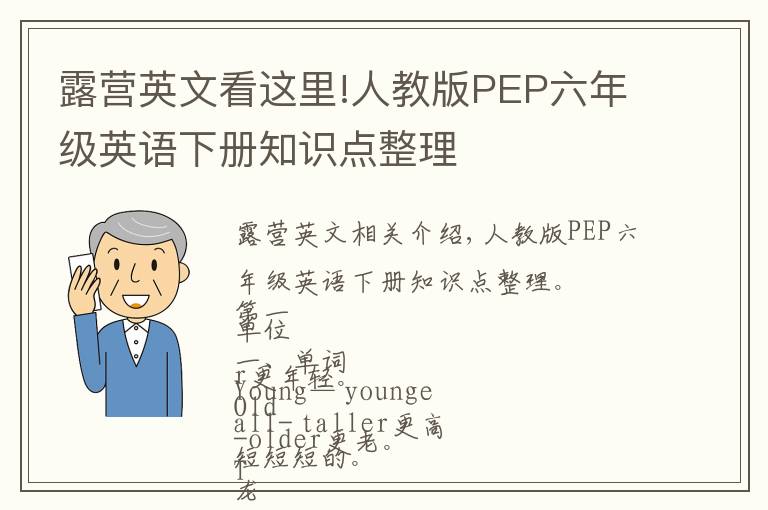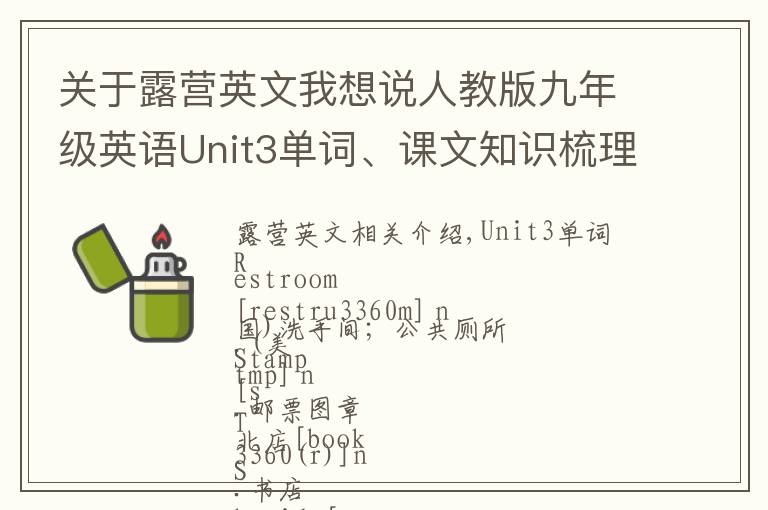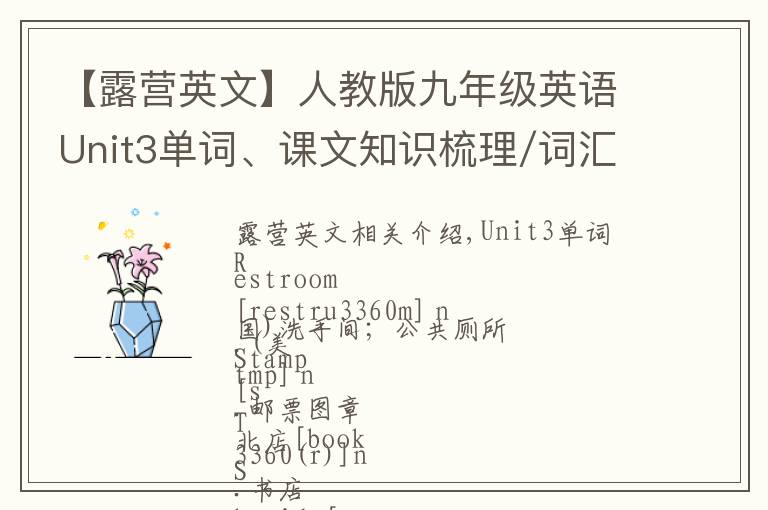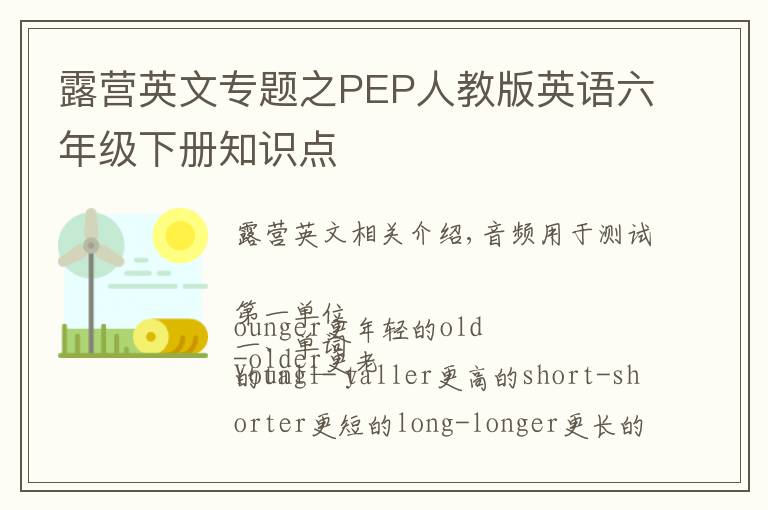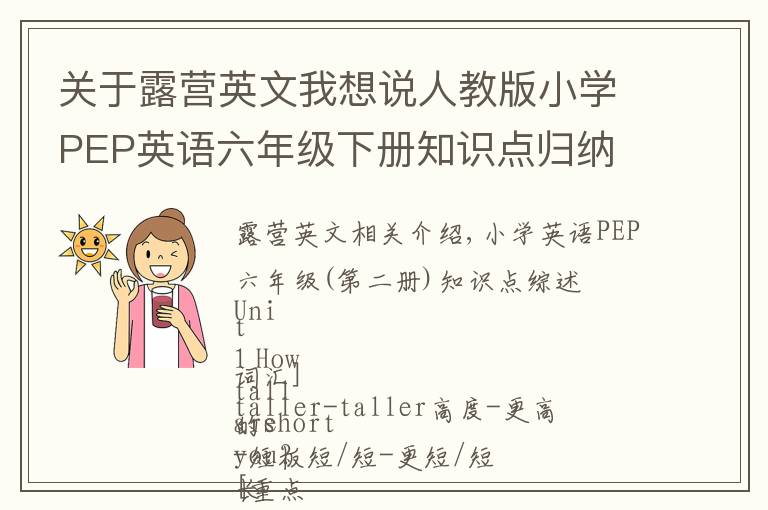3. Is that a good place to hang out?
那是不是一个闲荡的好地方?
4. kind of +adj/adv. “有点、一点”
She is kind of shy. 她有点害羞。
5. prefer 动词,更喜欢、宁愿。 常用的结构有:
①prefer sth. 更喜欢某事
I prefer English. 我更喜欢英语。
②prefer doing/ to do 宁愿做某事
I prefer sitting/ to sit.我宁愿坐着。
③prefer sth to sth. 同…相比更喜欢…...
I prefer dogs to cats. 与猫相比我更喜欢狗。
④prefer doing to doing 宁愿做某事而不愿做某事
I prefer walking to sitting. 我宁愿走路也不愿坐着
⑤prefer to do rather than do 宁愿做某事而不愿做某事
I prefer to work rather than be free. 我宁愿工作而不愿闲着。
6. I'm sorry to do sth. 对做某事我觉得很抱歉、伤心。
词汇精讲
1. information
information是不可数名词,意为“信息,情报”,常用some,much,a great deal of等修饰。表示“一条消息”用 a piece of information。例如:
A great deal of information can be stored in the computer.
计算机能储存大量的信息。
【拓展】辨析information,news与message
information 表示通过打听、观察及学习获得的资料。
news是不可数名词,意为“消息,新闻”,指通过广播、电视及报纸报道的事。
message是可数名词,意为“口信,消息”,指通过口头或笔头传递给他人的消息。
I like listening to news on the radio. 我喜欢听广播新闻。
Sorry,he isn’t in. Could you leave a message?
对不起,他不在家,请你留个口信好吗?
2. past
(1)past作介词,意为“经过,穿过”。例如:
Go past the hospital, and you will see the post office.
经过医院,你就会看到邮局。
(2)past作名词,意为“过去”。例如:
Alice has traveled a lot in the past.
爱丽丝在过去旅游了许多地方。
(3)past作形容词,意为“过去的,前任的”。例如:
Great changes have taken place in the past 20 years.
在过去的20年里发生了巨大的变化。
【拓展】
pass作动词,意为“经过,传递”;pass作名词,意为“关口,通过”。例如:
The school bus passed our garden. 校车经过了我们的花园。
Please pass me the book. 请把书递给我。
He has got a pass mark. 他达到了及格标准。
3. depend
depend意思为“依靠、依赖、取决于”等,只用作不及物动词,通常与介词 on, upon 连用,主要用法有:
(1) depend on/upon+某人或某物
Whether we’ll go camping depends on the weather.
我们是否去野营要看天气。
有时可在某人或某物后用介词for。
Children depend on their parents for food and clothing.
儿童的衣食靠父母。。
(2)depend on [upon]+从句
Our success depends on whether everyone works hard or not.
我们的成功取决于每个人是否努力。
The amount you pay depends on where you live.
你付多少钱要看你住什么地方。
(3)口语中说 It (all) depends. /That depends.意为“那要看情况”。
—Are you going too? 你也去吗?
—That depends. 那要看情况。
4. correct
(1)correct作形容词,意为“正确的;合适的;恰当的”,例如:
Do homework or read in a correct way.
用正确的方法做作业或者读书。
The correct answers can be found at the bottom of page 8.
正确答案在第8页末尾。
I think English men are very polite and very correct.
我认为英国人很有礼貌,举止非常得体。
(2)correct 作动词意为“改正,校正,改错,批改”等,例如:
It takes him a lot of time to correct the students’ homework.
批改学生的作业花费他很多时间。
He may need surgery to correct the problem.
他可能需要手术来矫正这一问题。
5. course
(1)course 作名词,意为“课程”,是可数名词,其复数为courses。例如:
He flunked the course. 他考试不及格。
The college course was then cut to three years.
大学学制那时缩短到三年。
(2) course 作名词还可以意为“球场、一道菜、道路;线路”等。例如:
There is an elaborate five-course meal.
这儿有五道菜的美餐。
The ship has altered its course.
这艘船改变了航线。
The country club has a golf course.
该地区俱乐部拥有高尔夫球场。
【拓展】course常用搭配有:
of course 自然,当然
in the course of discussion 在讨论期间
a matter of course 当然的事情
6. beside
beside作方位介词,以为“在……旁边”,例如:
I moved from behind my desk to sit beside her.
我从桌子后面走到她身边坐了下来。
His room is beside mine. 他的房间紧挨着我的房间。
【拓展】
besides“除……之外(还有……)”指在整体中加入一部分,表示一种累加关系,有“加上”之意。例如;
Besides milk, we need vegetables.
除了牛奶,我们还需要蔬菜。
Besides different types of gas, we can also use electricity (电) to run our cars.
除了气体之外,电也可以用来发动汽车。
7. look forward to
look forward to 意思是“期待,盼望”,to是介词,后面接名词或者动名词。
I look forward to being alone in the house.
我盼望能自己一人在这所房子。
We look forward to the return of spring.
我们期待着春天的到来。
【拓展】
虽然介词to与动词不定式符号to在形式上相同,但用法各异。主要区别归纳如下:
(1)介词to表示“向、往、对于 ” 等,既可以指时间、方向、距离、对象或结果,又可以指程度、直接或间接关系,后面必须接名词、代词等构成介词短语。
Japan is to the east ofChina. 日本在中国的东面。
Let’s drink to his health. 让我们为他的健康干杯。
He tied the monkey to the tree. 他把猴子拴在树上。
(2)动词不定式符号to无词义,后面必须接动词原形,构成不定式短语。
To play computer games is wrong. 玩电脑游戏是错误的。
My job is to teach English.我的工作是教英语。
I wish to go there. 我希望去那儿。
8. mean
(1)mean可以用作及物动词,意为“意欲,计划”。例如:
I mean you to spend this money for your daughter.
我是想让你用这笔款为你女儿买些东西的。
(2)mean还可以表示“预示”的意思。例如:
This snow means no sport this afternoon.
这场雪使今天下午的体育活动搞不成了。
(3)mean还可以指“(字、句等)意指,意味”的意思。
A dictionary tells you what words mean.
词典告诉你词语的含义。
【拓展】辨析:mean to do, mean doing;
mean to do是“打算,企图”的意思。mean doing是表示“意味着”的意思。例如:
I had meant to leave on Sunday. 我本打算周日走。
Missing the train means waiting for another hour.
赶不上火车意味着要再等一个小时。
句式精讲
1. Could you please…?
Could you please 后接动词原形,意为“请你……好吗?”是表示委婉且礼貌的请求,其否定形式是Could you please not 后接动词原形,意为“请你不要……好吗?”。
Could you please help me clean the room?
请你帮我打扫房间好吗?
Could you please not smoke here?
请你不要在这抽烟好吗?
肯定回答:sure./ Certainly./Of course./No problem./Yes, please.等。
否定回答:Sorry,I can’t. I have to…/ I’d love to, but I have to...否定回答要礼貌地说明理由。
注意:
Could you…?句型的回答中,回答中不用could,用can。这里could不表示过去时态,只表示语气委婉。
【拓展】
表示客气礼貌的请求句型:
1) Would you please do sth? 请你做某事好吗?
2) Would you like to do sth? 你愿意做某事吗?
3) Would you mind doing sth?你介意做某事吗?
4) Shall I/we do sth? 让我/我们做某事好吗?
5) Why not do sth? 为什么不做某事呢?
2. I wonder if…
wonder作及物动词,意为“想知道;对……感到怀疑”,常见的用法有:
(1)后接who, what,why,where 等引导的宾语从句。
I wonder who she is. 我想知道她是谁。
She wondered what the child was doing.
她感到疑惑,孩子究竟在干什么。
I wonder why Ann is late. 我想知道安为什么迟到了。
I wonder where they have gone. 我想知道他们去哪儿了。
(2)后接 that 引导的宾语从句,表示“对……感到惊讶”, that常可省去。
I wonder (that) she has won the race.
我对她赢了比赛感到惊讶。
(3)后接 if 或 whether 引导的宾语从句,常用来表示一种委婉的请求或疑问。
She wondered whether you were free that morning.
她想知道你那天上午是否有空。
I wonder if he will succeed.
我不知道他会不会成功。
3. Sorry,I’m not sure.
I’m not sure. 意为“我不确定”。sure用作形容词,意为“肯定的,有把握的”,常与be动词连用。
(1)be sure to do sth.意为“务必做某事”,表示要求,多用于祈使句;有时还可表示一种推断“肯定做某事”。例如:
Be sure to telephone me and give me all the news.
请一定要给我打电话,让我知道所有的消息。
The child is sure to be a teacher. 这孩子一定会成为一名教师。
(2) be sure of / about (doing) sth. 表示人对某事(物)的看法,意为“对……有把握”。其后常接名词、代词或动词-ing形式。例如:
Are you sure of passing the exam? 你有把握通过考试吗?
I'm not sure about English grammar. 我对英语语法没有把握。
(3)sure用作副词,意为“当然,的确”。常用来回答一般疑问句,相当于yes或certainly。例如:
—Are you going with us? 你和我们一起去吗?
—Sure. 当然啦。
4. You don’t need to rush!
need作实义动词,意为“需要”。常用搭配为need sth.或 need to do sth. , 例如:
I need some help. 我需要一些帮助。
You need to see a doctor. 你需要去看医生。
He needs to take a bus. 他需要去搭车。
need作情态动词,意为“需要”,后接动词原形。
If she wants anything, she only need ask.
她想要什么东西, 只要开口就行了。
You needn’t finish this work today.
你不必今天完成这项工作。
5. We even need to spend time leading in to a request.
spend是动词,意为“花费(时间或金钱)”。其过去式为spent。用法如下:
spend + 时间/金钱 + (in) doing sth. 花费时间或金钱做某事
spend + 时间/金钱 + on sth. 花费时间或金钱在某物上
例如:
I spend two hours in reading every day.
我每天花两个小时阅读。
He spends 20 yuan on books every month.
他每月花20元买书。
【拓展】表示“花费”的spend、take、cost和pay的辨析:
词语
主语
结构
spend
人(sb.)
sb. spends + 时间或金钱+ (in) doing sth. /on sth.
take
it作形式主语
It takes sb. some time to do sth.(真正主语)
pay
人(sb.)
sb. pays + 金钱+ for sth.
cost
sth.(物)
sth. costs sb. + 金钱
例如:
I spent 3 hours (in) doing /on my homework yesterday.
昨天我花了三个小时做作业。
It took me four hours to go to Wuhan by bus.
乘公共汽车去武汉花了我四个小时。
I paid six yuan for the pen.
我花了六元钱买这支笔。
My English book cost me five yuan.
我的英语书花了我五元钱。
【版权说明】本文来源于网络,版权归原作者所有,如涉版权,请联系删除。
1.《露营英文看这里!人教版九年级英语Unit3单词、课文知识梳理/词汇句式精讲》援引自互联网,旨在传递更多网络信息知识,仅代表作者本人观点,与本网站无关,侵删请联系页脚下方联系方式。
2.《露营英文看这里!人教版九年级英语Unit3单词、课文知识梳理/词汇句式精讲》仅供读者参考,本网站未对该内容进行证实,对其原创性、真实性、完整性、及时性不作任何保证。
3.文章转载时请保留本站内容来源地址,https://www.lu-xu.com/tiyu/2143037.html
